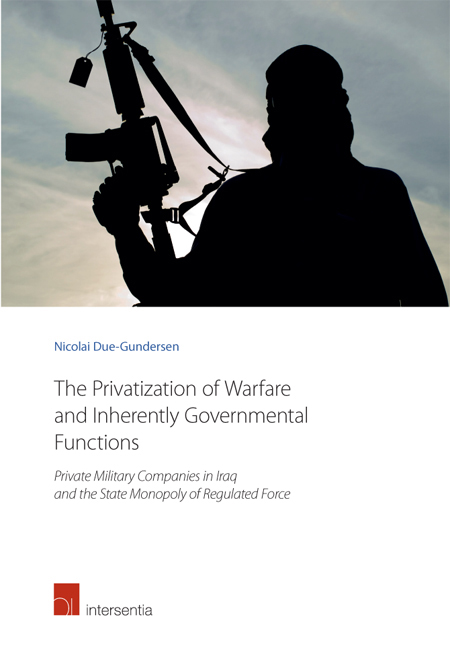 The Privatization of Warfare and Inherently Governmental Functions
The Privatization of Warfare and Inherently Governmental Functions Book contents
- Frontmatter
- Acknowledgments
- Contents
- Chapter 1 Introduction
- Chapter 2 The Recent History of PMCs
- Chapter 3 Literature Review
- Chapter 4 Methodology
- Chapter 5 Theoretical Approach and Terminology
- Chapter 6 Research Design
- Chapter 7 Main Analysis
- Chapter 8 The International Legitimacy of the ICoC
- Chapter 9 Final Conclusion
- Chapter 10 Addendum: The Business of Human Rights and Militarized Resource Companies (MRCs)
- References
- Appendices
Chapter 1 - Introduction
Published online by Cambridge University Press: 21 September 2018
- Frontmatter
- Acknowledgments
- Contents
- Chapter 1 Introduction
- Chapter 2 The Recent History of PMCs
- Chapter 3 Literature Review
- Chapter 4 Methodology
- Chapter 5 Theoretical Approach and Terminology
- Chapter 6 Research Design
- Chapter 7 Main Analysis
- Chapter 8 The International Legitimacy of the ICoC
- Chapter 9 Final Conclusion
- Chapter 10 Addendum: The Business of Human Rights and Militarized Resource Companies (MRCs)
- References
- Appendices
Summary
Privatized peace. Mercenaries. Dogs of War. These are some of the phrases popularly used to describe private military companies and their activities. Since the 2003 U.S. invasion of Iraq, there has been an increased focus on the existence and role of private military companies. Not only has Iraq been a concentrated effort for the U.S. government, but significantly, it has seen the largest commitment of the entire private military industry in over thirty years.3It is true that many firms in the industry engage in noncombat tasks, including logistics and administration services, weapons maintenance and security and military training.
However, it is also true that many such companies have gotten increasingly closer to the heart of armed conflict and military tasks. Most recently, such a shift in privatized duties has been brutally exemplified by two incidents in Iraq.
The 2004 Abu Ghraib Prison Scandal, in which two U.S. contractors were implicated, saw questions arise over the nature of accountability, the chain of command and which tasks were too inherently governmental to be outsourced. Just three years later, U.S. contractor Blackwater was implicated in the Nisour Square Massacre, in which seventeen Iraqi citizens were killed and up to eighteen wounded. The U.S. government responded with efforts that sought to increase oversight of hired contractors, citing fears of negative contractor behavior having the potential to undermine the perceived legitimacy of U.S. operations.
The potential for private military companies to erode the (client) state's monopoly over the regulation of force has therefore become of increasing contemporary concern. Since the 2003 invasion, there has been a surge in available literature covering the topic of PMC's. Such literature has oft en been published in journals of International Humanitarian Law and conflict resolution commonly addressing the legal status of PMCs and their staff members, tasks that may be outsourced, and critiquing the current (lack of) domestic and international regulation of PMC activity. Few studies, however, specifically attempt to address whether state use of private military companies can have the potential to erode state monopoly over the regulation of force. Furthermore, there is also a lack of literature that examines whether the use of PMCs can affect public perceptions of state legitimacy.
- Type
- Chapter
- Information
- The Privatization of Warfare and Inherently Governmental FunctionsPrivate Military Companies in Iraq and the State Monopoly of Regulated Force, pp. 1 - 6Publisher: IntersentiaPrint publication year: 2016


